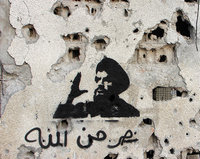JERUSALEM -- Last Friday, Sept. 11, Katyusha rockets fired from southern Lebanon landed near the town of Nahariya in northern Israel. Israel retaliated, firing shells into Lebanon and scrambling fighter jets. No one was hurt, but the incident highlighted just how easily and in how many ways fighting could restart across Israel's dangerous northern border. The episode also brought to mind a mostly quiet rivalry that has lain dormant, but could stir without warning inside Lebanon: Hezbollah and al-Qaida despise one another, and in this part of the world, hatred usually leads to bloodshed.
Israel declared that it held the Lebanese government responsible for last week's cross-border attack. But in Lebanon, a country where the government does not have control over all armed militias and does not even insist on its right to do so, it is unclear who actually fired the rockets into Israel.
Hezbollah, which possesses tens of thousands of rockets in southern Lebanon, immediately denied it had anything to do with the attack. Then, a militant group linked to al-Qaida issued an online statement taking responsibility. The group identified itself as the Ziad al-Jarrah division of the Abdullah Azzam Brigades. Al-Jarrah was the Lebanese-born man who piloted United Airlines Flight 93 into the World Trade Center on 9/11, exactly eight years before last week's rocket fire.

